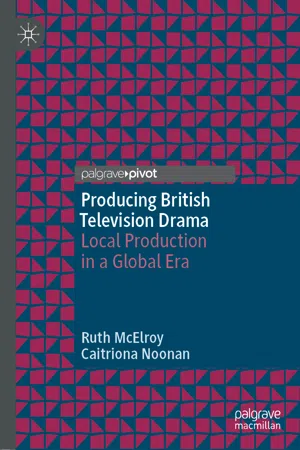This book critically interrogates a key moment of change focusing on how the processes of commissioning , producing and distributing drama content are evolving. It provides readers with original, empirically grounded insight into the factors driving this evolution and focuses on the UK as a major supplier of, and market for, television drama . This is a significant moment in the restructuring of television production as critical discussions continue about the future of European models of public service broadcasting , technological innovation alters audience consumption patterns and greater competition comes in the form of new incumbents . This book is a critical response to this moment. While the forces of globalisation undoubtedly influence television production, we recognise local and global as two ingredients in this mix. It is the mobility, not only of texts, but also of policies , professional practices, and workers across local , national and global territories that resonate clearly and so throughout this book we attend to these different levels. While these processes are often alluded to, they are not consistently documented at the grass roots level of television production , nor are they always followed through in terms of how they impact on what we see on screen. Therefore, this book presents an intervention into scholarly debates by analysing the challenges and opportunities of making television drama in specific national and regional contexts. It critically analyses the specific set of conditions which impact on television drama’s production at a local level and it argues for the value of attending to these conditions in the current digital era.
Our approach is informed by a sense of urgency and crisis in the midst of what is more commonly being framed as a ‘golden age’ of unparalleled abundance. Undoubtedly, a rich compendium of drama is being delivered by recent entrants such as Netflix , Hulu and Amazon Prime , but we eschew reading this as evidence of a sustainable pipeline of television drama production . Instead we assess holistically the broad ecology of television drama production and identify features of stress and erosion that we believe threaten the diversity and sustainability of this ecology . These areas of stress and erosion reflect the prevalence of neoliberal formations of market value, globalisation and deregulation in contemporary television production. Over the past decade or so, television drama has been transformed from a poor relation of Hollywood film to become a transnational phenomenon in its own right. As a corrective to the celebratory discourses of the ‘era of abundance’ and the ‘golden age’, we offer a richer, situated analysis of the precarity of the current ecology of drama production including the public service broadcasters and labour markets that sustain it. Without television drama, there would be a far inferior television service, be that from the subscription video on-demand (SVoD) suppliers or from longstanding public service broadcasters such as the BBC and ITV.
The Significance of Local Production
We advocate for the significance of local production in a global era of digital television . Television drama production has become an increasingly global business ranging from transnational content providers to multi-territory rights deals. However, a focus on international markets and global players can eclipse a deeper understanding of the material realities of who makes television drama. This book presents a compelling case for a paradigmatic shift towards centering the sustainability of local production in our understanding of how the current disruptions are shaping the sector. Like many of those working in and researching this sector, we attempt to make sense of a rapidly changing media environment in which the global and the local are in a dynamic and evolving relationship. This relationship is economic in character as new markets emerge for local content, and at the same time global players enter local production ecologies . However, we argue that there are overarching public values at stake within local production ecologies that go to the specific cultural and social significance of television drama .
Here we pause a moment to distinguish between local production and local drama. While both may overlap they are conceptually distinct. Take for instance the case of the highly successful drama Sherlock (2010–2017). While Sherlock is made in Cardiff , the series ’ fictional location is London , including the iconic 221B Baker Street, home to the eponymous detective. Frequently what appears on screen as London is in fact Cardiff. For example, in series two, episode three ‘The Reichenbach Fall’, scenes that are presented narratively as taking place in the Tower of London were actually shot in the far more accessible Cardiff Castle. Equally, our case study in Chapter 6, Game of Thrones (2011–2019), showcases much of the Northern Irish landscape as part of its filming in the region. Undoubtedly, both productions provide significant job opportunities for the local creative workforce and the opportunity for Cardiff and Northern Ireland to be seen on screens around the world. However, neither series tells viewers about the history or identity of the place or portrays the lives of those living there through their stories. Contemporary drama production renders places simultaneously visible and invisible, and as our research attests, this matters to viewers and local television professionals.
Th...
